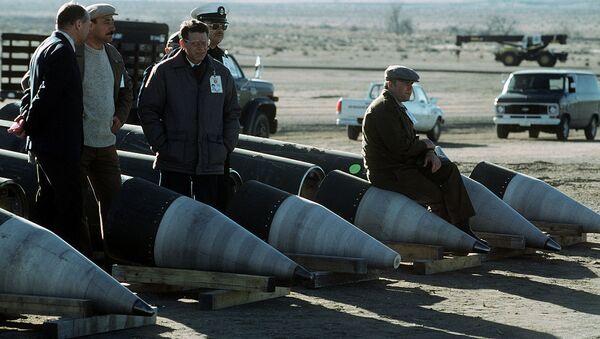The Intermediate-Range Nuclear Forces (INF) Treaty, signed by then-US President Ronald Reagan and Soviet General Secretary Mikhail Gorbachev in 1987, was officially pronounced dead on 2 August 2019.
Here's what it means for nuclear proliferation.
-
The United States suspended its participation in the INF Treaty on 2 February and on 2 August Washington formally withdrew from the arms control pact, which banned the deployment of ground-based nuclear weapons with a range of 500 to 5,500 km. Under the landmark treaty, the Soviet Union and the United States agreed to destroy a significant part of their arsenals, thereby ending the arms race. Those historic achievements are now at risk.
-
The US Department of Defence claims that Washington does not intend to deploy new ground-based nuclear missiles in Europe. However, Aegis Ashore missile defence systems already present in Romania can, if necessary, be replaced by intermediate-range missiles and repurposed for offensive capabilities. Such missiles achieve their targets in a matter of minutes, without leaving the enemy a chance to prepare and repel the attack.
-
The United States and NATO do not need to deploy new ground-based missile systems in order to build nuclear capabilities in Europe. Instead, they can simply boost the presence of ships and nuclear submarines and increase the number of air-based nuclear weapons on the European stage.
-
The treaty extended only to the United States and Russia that is, only two members of the so-called "Nuclear Club". Following in Washington's footsteps, Moscow suspended its participation in the treaty as well, reserving the right to take symmetric measures in matters of ground-based nuclear missiles. Both parties have long questioned each other's compliance with the agreement and exchanged accusations, which eventually led to the pact's break-up. The prospects of finding a way out of the deadlock remain vague: while the United States favours negotiating a new accord that would include other nuclear-armed parties, such as China, Beijing has consistently rejected any idea of joining an INF Treaty 2.0.
- The agreement's downfall risks triggering a chain reaction that would see the potential expiration of another US-Russia arms control treaty, New START, in 2021 that helped both sidea to reach historically low levels of deployed strategic nuclear warheads.




